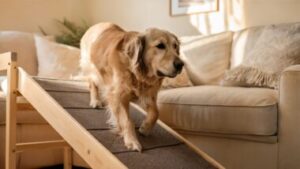Understanding Your Senior Dog's Needs
Knowing how to take care of a senior dog and spot the symptoms of aging is crucial when your dog reaches its senior years. Your dog may seem less energetic and sluggish than usual. Greying their once-vibrant coat, particularly around the snout, is possible. Navigating their environment may be more challenging if their vision is impaired or cloudy. Older canines often have hearing loss as well.
Deterioration in cognitive abilities is a devastating development. Your dog could become bewildered occasionally and stop responding to your orders. Stay calm and understanding since it's going to be tough.
Specialized health problems also affect older canines more frequently. Conditions such as arthritis and joint discomfort may hinder their mobility. Tooth decay, gum disease, and other dental issues can make eating painful and difficult. Diseases of the heart, kidneys, and cancer tend to manifest more frequently in older dogs.
Your senior dog can age more quickly and gracefully if you take the time to learn what they require. Visiting your vet often might help detect health problems in their early stages. Changes in eating habits and exercise programs can improve their health and happiness. Most importantly, you can make their golden years golden by showering them with love and care.
What percentage of senior dogs develop each of these health conditions?
Several health problems are more common in older dogs (defined as seven years of age and up), according to the AAHA. Some data on the frequency of each condition is presented here:
- Arthritis: 20% of dogs over seven years old suffer from osteoarthritis (Source: AAHA)
- Dental problems: 80% of dogs over three years old have some form of dental disease (Source: American Veterinary Dental Society)
- Heart disease: 10% of dogs over seven years old have heart disease (Source: AAHA)
- Kidney disease: 10% of dogs over seven years old have kidney disease (Source: AAHA)
- Cancer: 50% of dogs over ten years old will develop cancer (Source: American Veterinary Medical Association)
Adjusting Your Senior Dog's Diet
Dietary requirements for dogs fluctuate with age. Discussing the matter with your veterinarian is crucial to ensuring your older dog's continued health and happiness.
Change to a lower-calorie diet for your sedentary dog. Doing so can lessen your risk of gaining weight and the health problems it causes. Choose meals rich in fiber for your dog's digestive health and fullness.
Older dogs need a diet high in protein to maintain their muscular mass. Your doctor may suggest a high-protein dog diet designed for older dogs.
Older dogs, especially those suffering from musculoskeletal problems or cognitive loss, might benefit from supplements. Glutamine and chondroitin can help with joint discomfort and limited movement. Omega-3 fatty acids benefit the brain and may even delay cognitive deterioration.
To prevent gastrointestinal problems, gradually introduce new foods to your senior dog's diet. Over a week or two, gradually increase the percentage of new food by mixing it with their existing meal.
Dietary requirements for dogs might differ from one dog to another depending on factors like breed and current health condition. Consult your doctor to ensure your older dog gets the right food.
 Modifying Your Senior Dog's Exercise Routine
Modifying Your Senior Dog's Exercise Routine
As your dog ages, its activity requirements will naturally change, so it's important to make those adjustments. Although regular exercise is essential for a senior dog's physical and mental health, you'll need to make some adjustments to make it safe and comfortable for him.
To start, rather than going for a few lengthy walks per day, try going for shorter ones more often. This way, your dog may obtain the required activity without becoming too tired. If your dog shows symptoms of exhaustion, such as dragging or panting excessively, paying attention to his energy levels is essential.
Swimming and other low-impact exercises are perfect for older dogs since they engage the entire body without putting too much strain on the joints. Look into canine hydrotherapy classes or take your water-loving dog to a dog-friendly beach if it likes being in the water.
For older dogs, mental stimulation is as vital as physical activity. To stimulate your dog's intellect, try using puzzle toys, mild teaching methods, and activities using his nose. This can assist them in maintaining mental acuity and delay the onset of cognitive loss.
Because of the wear and tear on their joints, older dogs should not participate in vigorous play or exercises that require them to leap or make sharp turns. Instead, they should engage in mild pursuits such as swimming, quiet strolls, and games that stimulate the mind.
Lastly, ensure your older dog has a soft spot to relax after a workout. Create a cozy, supportive bed in a warm and free-of-drafts room. This will allow your dog to rest and recuperate after an active day, essential for its health and happiness as it ages.
 Adapting Your Home for Your Senior Dog's Comfort
Adapting Your Home for Your Senior Dog's Comfort
It is essential to make adjustments around the house to ensure your dog's safety and comfort as they age. Several easy adjustments are as follows:
- Install ramps or steps to simplify accessing the outdoors or furnishings. This is a lifesaver for dogs suffering from joint discomfort or arthritis.
- Use non-slip mats on slick flooring, such as tile or hardwood. This will give your dog self-assurance and reduce its likelihood of tumbles.
- Find a suitable height for the bowls of food and drink. Your elderly dog may feel less tension in their neck and back.
- Make sure there's a well-padded bed available. You could get your dog a bed with orthopedic or memory foam to ease the joint strain.
A warm, draft-free house is a comfortable home. Make sure your older dog has a warm, cozy place to sleep, away from drafts, because they are more easily frightened by sudden changes in temperature.
These simple adjustments can significantly improve your older dog's quality of life. By making the necessary adjustments to your home, you can ensure your dog has all it needs to live out its elderly years comfortably.
 Staying on Top of Your Senior Dog's Health
Staying on Top of Your Senior Dog's Health
More than ever before, once your dog reaches its senior years, you must pay close attention to its health. You are the one who knows your dog best. Therefore, you will probably pick up any changes in their behavior or health first.
If your dog is seven or older, you should take them in for a checkup at least every six months. Doing so will aid in the early detection of any possible health problems. At these checkups, mention any changes—big or little—in your dog's health or behavior.
Make sure to prioritize your oral health! To avoid the discomfort of gum disease and tooth decay, it's essential to maintain a regular dental cleaning and brushing schedule. Your vet can teach you how to brush your dog's teeth at home.
Your dog's skin and coat need constant attention. Watch for any changes in skin color, texture, or tender spots. If you observe anything unusual, consult a veterinarian.
Keep an eye on how much water and food your dog drinks. Look for any changes in your thirst, eating habits, or frequency of restroom breaks; these can indicate potential health issues. If your dog abruptly stops eating or drinking, a trip to the clinic is in order.
Lastly, ensure your dog's vaccines and parasite preventatives are current. Even if your elderly dog stays indoors most of the time, it still requires health care to prevent parasites and infections.
By being watchful and collaborating closely with your veterinarian, you can ensure your senior dog's health and comfort during its golden years.
 Providing End-of-Life Care for Your Senior Dog
Providing End-of-Life Care for Your Senior Dog
Prioritizing your dog's comfort and quality of life should be your priority as they approach their golden years. Discuss openly with your vet the many alternatives for pain treatment and the times when euthanasia may be necessary.
Keep food and water within easy reach, and make sure your older dog has a comfortable, supportive bed. During this time, shower them with lots of tender, loving care.
Hospice care and in-home euthanasia options should be considered if your dog's quality of life is deteriorating. Your dog can spend their last days at home with you and all of their favorite things by choosing one of these alternatives.
When you love a pet, it's never easy to say goodbye. Give yourself time to grieve and reflect on the wonderful times you spent with your aging dog.
You might want to make a keepsake, like a picture album or a unique piece of jewelry, to remember them by. Contact loved ones or a support group if you need comfort at this challenging time.
The ultimate act of love is giving end-of-life care to your senior dog. Even if it's challenging to let go, you prioritize their needs and comfort.
FAQ for “Understanding Your Senior Dog's Needs”
Q1: What are some common signs of aging in senior dogs?
A1: As dogs enter their senior years, you may notice decreased activity, graying around the muzzle, cloudy eyes, and hearing loss. They might also experience cognitive decline, arthritis, dental issues, and more susceptibility to diseases like heart disease, kidney disease, and cancer.
Q2: How should I adjust my senior dog's diet to meet their changing needs?
A2: Adjusting your senior dog's diet involves consulting with your vet to ensure they receive adequate nutrition. Lower-calorie foods should be considered to prevent weight gain, higher fiber should be consumed for digestive health, and increased protein should be consumed to maintain muscle mass. Supplements like glucosamine, chondroitin, and omega-3 fatty acids can also support joint and cognitive health.
Q3: What are some low-impact exercises suitable for senior dogs?
A3: Low-impact exercises like shorter, frequent walks and swimming are ideal for senior dogs. These activities provide necessary physical activity without stressing their joints. Additionally, mental stimulation through puzzle toys, gentle training, and nose work games is beneficial for keeping their minds sharp.
Q4: How can I make my home more comfortable for my senior dog?
A4: To make your home senior-dog-friendly, add ramps or stairs to help them access furniture or outdoors, use non-slip mats on slippery surfaces, raise food and water bowls to a comfortable height, and provide a relaxed, supportive bed. Keeping the home warm and draft-free also ensures their comfort.
Q5: How often should I take my senior dog to the vet for checkups?
A5: For senior dogs (ages seven and older), it's recommended to schedule regular vet checkups every six months. These visits help catch potential health issues early. Discuss any changes in behavior or health with your vet, keep up with dental cleanings, monitor their skin and coat, and ensure vaccinations and parasite prevention are current.
Resources for Senior Dog Care
You can find more information and support for caring for your senior dog through these helpful resources:
- The American Veterinary Medical Association offers a comprehensive senior pet care guide with nutrition, exercise, and health monitoring tips.
- If you're facing difficult end-of-life decisions, the Association for Pet Loss and Bereavement offers resources and support for grieving pet owners.
Remember, your veterinarian is always the best resource for personalized advice on your senior dog's care. Don't hesitate to reach out with any questions or concerns about your aging furry friend.
The post How To Take Care Of A Senior Dog: Golden Years appeared first on Happy Pets Grooming Table.
The post How To Take Care Of A Senior Dog: Golden Years appeared first on Ai Ninja Toolbox.
The Article How To Take Care Of A Senior Dog: Golden Years Was Found On https://limitsofstrategy.com
The Article How To Take Care Of A Senior Dog: Golden Years First Appeared ON
: https://ad4sc.com
 Modifying Your Senior Dog's Exercise Routine
Modifying Your Senior Dog's Exercise Routine Adapting Your Home for Your Senior Dog's Comfort
Adapting Your Home for Your Senior Dog's Comfort Staying on Top of Your Senior Dog's Health
Staying on Top of Your Senior Dog's Health Providing End-of-Life Care for Your Senior Dog
Providing End-of-Life Care for Your Senior Dog




Comments are closed